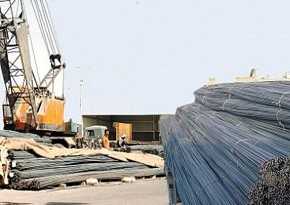 An Egyptian steel official reported Monday that Egypt's steel imports from Turkey picked up strongly in the past two to three weeks after global prices fell although prices on the Egyptian market stayed firm
An Egyptian steel official reported Monday that Egypt's steel imports from Turkey picked up strongly in the past two to three weeks after global prices fell although prices on the Egyptian market stayed firmRising Turkish imports in 2009 prompted some Egyptian producers to call for anti-dumping action, a move Egypt has said it was considering.
Mohamed Sayed Hanafy, general manager of the Chamber of Metallurgical Industries, said he saw Egyptian steel demand rising 10 to 15 percent in 2010, more than some other official and independent forecasts for a rise of up to 10 percent.
Turkish steel imports "started to be heavy just two-three weeks ago after the last increase in local prices and at the same time as the decrease in the world prices," he told Reuters.
He did not give an import figure, but Hanafy said Egypt's steel imports last year exceeded 3 million tonnes, with around 90 percent coming from Turkey.
"Locally the prices (per tonne) are now around 3,300 Egyptian pounds. The Turkish imports are 50-100 Egyptian pounds less than that," he said, adding that the local price was just 3,000 pounds per tonne two months ago.
Hanafy said Egyptian prices had not fallen in line with global moves because Egyptian producers were still using raw materials purchased in January when they were more costly.
On the international market, steel billet prices in the Black Sea region slid last week as restocking slowed and demand for finished products came under pressure. The price of scrap, a key steelmaking ingredient, also dipped.
Demand for new housing in the Arab world's most populous country has kept its construction industry strong despite the global economic downturn, making Egypt a major market for Turkish steel exports.
Hanafy said the surge in cheaper imports meant Egyptian producers were not running at full capacity, leading to less efficient production and, therefore, raising output costs. He said firms were losing 200 pounds per tonne as result.
"We have new rolling plants with a capacity of 1.2 million tonnes that came into operation last year. It means that if the demand is good, the production must increase. But instead, it only increased by 100,000 tonnes," he said.
"All the plants are working at a very low utilisation rate," he said, adding that production had fallen to as low as 50 percent of capacity at certain mills.
"Egyptian companies have the capacity to cover all the market demand," he said, adding that he forecast demand rising by 10-15 percent this year to around 7 million tonnes.
Hanafy said the Trade Ministry was reviewing documents related to the dumping issue but a decision could take months.
"I don't know the timing, up until now the ministry is still asking questions," Hanafy said, adding that the investigating team was likely to ask for information from the Turkish side.
Veysel Yayan, secretary-general of the Turkish Steel Producers Association, told Reuters in January in Istanbul that if any anti-dumping action went ahead, it would violate a bilateral free trade deal.
"Both Turkey and Egypt import the raw materials, mainly billet and scrap. The cost of labour and power in Egypt is less than in Turkey. In this case, how can they sell at this price?" Hanafy said.



